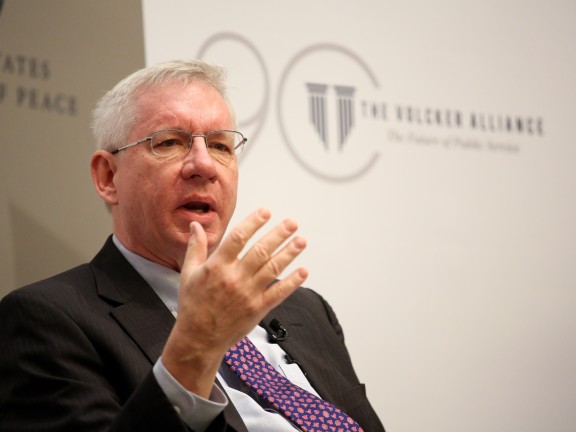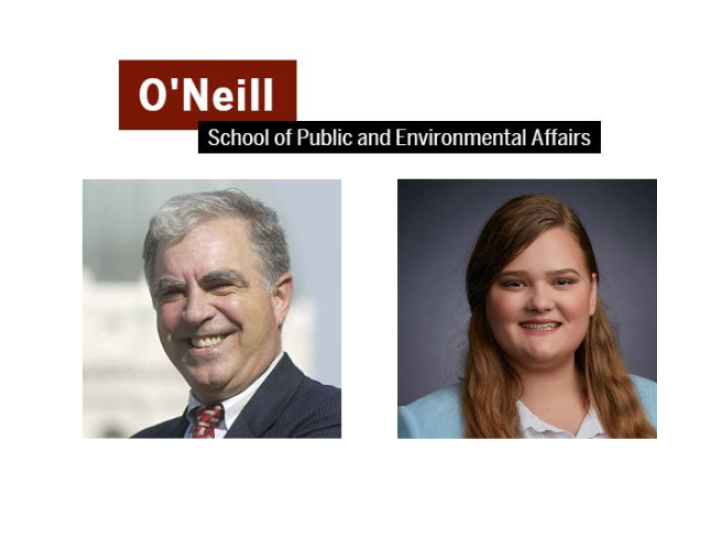Celebrating the Legacy of a Public Service Legend

This article was originally posted by GovExec on November 13, 2017.
It was a treat to step away from the “you can’t make it up” headlines last week to attend the Nov. 9 symposium celebrating former Chairman of the Federal Reserve Paul Volcker’s contributions to public service and his 90th birthday. The entire event was inspiring (it can be viewed online) but three big takeaways have stuck with me.
The first is that among Paul Volcker’s many contributions to the county, he wants public service to be his lasting legacy. It’s hard to think of any person in public life who’s had a bigger, broader, or longer impact on policy, from his monumental decisions that broke the back of crippling inflation in the late 1970’s and early 1980’s to his leadership of a global strategy to return savings stolen from Holocaust survivors.
He was the force behind the “Volcker Rule,” designed to limit speculation by bankers as part of a strategy to prevent a recurrence of the 1998 banking collapse. Is there anyone else in American politics whose name would so naturally lead to the notion of a rule?
But among all his contributions, Volcker has focused most squarely on creating a fresh vision for public service: making government work and building trust in its ability to do so. His Volcker Alliance is driving this vital work forward.
The second big takeaway was the focus on the importance of growing a new generation of public servants—and a remarkable consensus that the work of the future is both new and exciting. For example, Ramayya Krishnan, dean of Carnegie Mellon University’s Heinz College, made a powerful case that technology and data are combining to create a very different future for government. His examples were mind-spinning, from autonomous trucks zooming down interstates to artificial intelligence reshaping the way managers manage.
Especially notable was Krishnan’s warning that citizens were unlikely to tolerate a growing gap between the way government works and the services they receive from the private sector. In a world of Alexa and Siri and one-touch online ordering, citizens aren’t likely to trust a government that fails to rise to the same standards.
Somebody has to figure this out—and the somebodies are going to have to come from a new generation of public servants who understand the world Krishnan describes and who know how to lead it. We often focus on the Baby Boomers’ retirement from government as a problem of replacing one generation with another. It’s increasingly clear that it has to be replacing one vision of governance with a fresh, forward-looking one. We need to develop new roads for Millennials into government: not only because the retiring Boomers will create many vacancies but also because we need insights and instincts that the Boomers just don’t have. That’s a fascinating puzzle on which the symposium put a bright spotlight.
The third takeaway came from star-studded panels with leaders like advisor-to-presidents David Gergen, former Congressman Barney Frank, former Transportation Secretary and Charlotte Mayor Anthony Foxx, former Office of Personnel Management Director Beth Cobert, and Syracuse Mayor Stephanie Miner. I observed a remarkable thing: When they talked about public service, they all were smiling. The energy, enthusiasm and excitement were palpable. There were also some fireworks, including a vigorous debate between Gergen and Frank about what it would take to transform American politics into a trusted system that works.
There was notable unity behind a core idea: each of these figures found public service immensely rewarding, despite the many challenges, for reasons that went to the core of their being. It was great watching younger members of the audience—the next generation of public servants—eagerly drink it up.
The seismic battles that regularly shake Washington all too often discourage even the most hopeful players. But the symposium pointed to an exciting future for government. It also established the great honor and reward that goes to many who devote their careers to it.
That might sound hokey. There’s often a lot of lip service to the critical importance of public service. It was impossible to listen to the discussions throughout this symposium, however, without understanding just how visceral and important this thing we call “public service” truly is. It would be hard to think of a better legacy for Volcker’s own distinguished career of public service.

